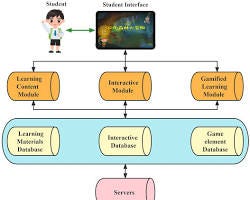Artificial Intelligence in Education
Artificial Intelligence in Education

The AI Revolution in Education: Transforming Learning for the Future
Imagine classrooms buzzing with personalized learning: students exploring the depths of the Amazon rainforest in VR, robots providing real-time feedback on essays, and adaptive algorithms crafting individualized learning paths. This isn’t science fiction; it’s the future of education powered by artificial intelligence (AI).

The education landscape is on the cusp of a transformative era, and AI is the driving force. From personalized learning pathways to engaging virtual simulations, AI is poised to reshape the way we learn and teach, paving the way for a more accessible, effective, and personalized educational experience for every student.
Unlocking the Power of Personalized Learning:
One-size-fits-all education is a relic of the past. AI algorithms can analyze student data, learning styles, and strengths to create customized learning plans that cater to individual needs. A student struggling with calculus gets extra practice problems and interactive tutorials, while another dives deeper into astrophysics with advanced simulations and virtual labs. This tailored approach allows students to progress at their own pace, master concepts deeply, and overcome challenges that might have hindered them in a standardized setting.

Boosting Engagement and Retention:
Learning doesn’t have to be monotonous! AI-powered tools can inject excitement and engagement into the educational process. Immersive VR experiences can transport students to the Great Barrier Reef, dissect a virtual frog in biology class, or even travel back in time to witness historical events in vivid detail. Gamified learning platforms with interactive challenges and rewards can turn learning into a fun and engaging adventure, motivating students to persevere and achieve their goals.

Empowering Teachers and Enhancing Efficiency:
The role of teachers isn’t threatened by AI; it’s transformed. AI can handle tedious tasks like grading essays, scheduling assignments, and providing basic feedback, freeing up valuable time for teachers to focus on what they do best: individualized support, creative lesson planning, and building meaningful connections with their students. This empowers teachers to become facilitators and mentors, guiding students on their unique learning journeys and providing tailored support when needed.

Addressing Challenges and Ensuring Equity:
While AI holds immense promise, its integration into education requires careful consideration. Data privacy concerns need to be addressed to ensure student information is protected. Bias in algorithms must be identified and mitigated to avoid disadvantaging certain groups. Furthermore, ensuring equitable access to AI-powered tools is crucial to prevent widening the digital divide and exacerbating existing inequalities.
The Future of Learning: A Collaborative Human-AI Landscape:
The future of education isn’t about machines replacing teachers; it’s about humans and AI collaborating to create a dynamic and personalized learning environment. By harnessing the power of AI responsibly and ethically, we can unlock a world where every student has the opportunity to reach their full potential, regardless of their background or learning style.
This journey into an AI-powered educational landscape has just begun, and the possibilities are endless. Are you ready to be a part of this transformative revolution?

Comments
Post a Comment